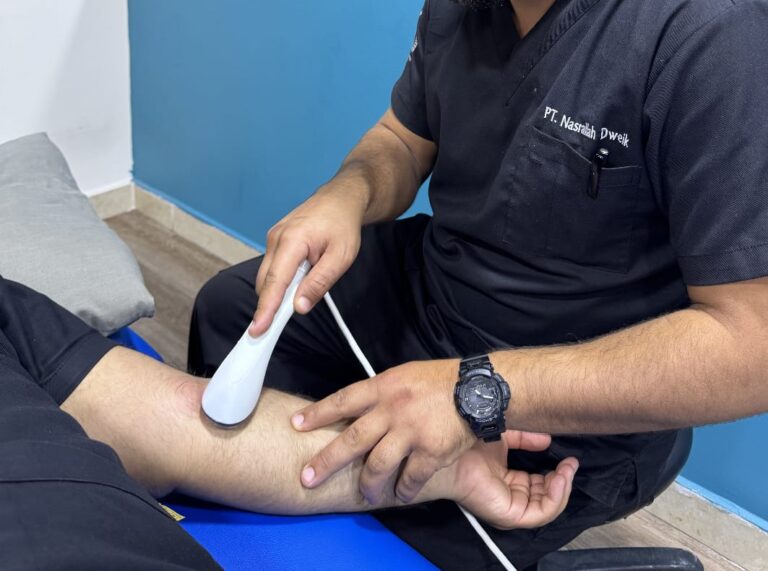De Quervain’s Syndrome: Causes, Symptoms, and Physiotherapy Treatment
Kilani
July 17, 2025

Introduction
De Quervain’s Syndrome, also known as De Quervain’s Tenosynovitis, is a painful condition that affects the tendons on the thumb side of the wrist. It is a common disorder among individuals who perform repetitive hand or wrist movements, such as lifting, typing, or gripping.
At Kilani Physiotherapy Center, we specialize in evidence-based, non-invasive approaches to manage this condition effectively and help patients regain full, pain-free function.
What Is De Quervain’s Syndrome?
De Quervain’s Syndrome is an inflammation of the sheath (synovium) surrounding two tendons in the wrist — the abductor pollicis longus (APL) and extensor pollicis brevis (EPB). These tendons are responsible for moving the thumb away from the hand, and when irritated, they can cause pain and swelling that make thumb and wrist movements difficult.
Common Causes
This condition is usually caused by overuse or repetitive stress on the wrist and thumb. Some common triggers include:
Repetitive thumb or wrist movements (e.g., texting, typing, lifting)
Frequent lifting of infants or groceries
Sports or hobbies involving gripping (e.g., tennis, gardening)
Direct injury to the wrist
Inflammatory conditions like rheumatoid arthritis
Hormonal changes (common in new mothers)
Symptoms of De Quervain’s Syndrome
The hallmark signs of De Quervain’s Syndrome include:
Pain and tenderness at the base of the thumb and along the wrist
Swelling near the base of the thumb
Difficulty gripping or pinching
A sticking or snapping sensation when moving the thumb
Increased pain with thumb or wrist movement, especially when twisting
One common diagnostic test is the Finkelstein test, where the patient tucks the thumb into the palm and bends the wrist toward the little finger. If this motion causes sharp pain, De Quervain’s is likely.
Treatment Options
Treatment for De Quervain’s Syndrome depends on the severity of the symptoms. Early intervention can prevent the need for surgery. Common approaches include:
1. Conservative (Non-Surgical) Treatment
Rest and activity modification: Avoiding movements that aggravate symptoms.
Wrist/thumb splinting: Immobilizing the area to reduce inflammation.
Anti-inflammatory medication: NSAIDs like ibuprofen to reduce swelling.
Corticosteroid injections: For severe inflammation and pain relief.
2. Surgical Intervention
If conservative methods fail after several weeks or months, surgery may be recommended to release the tendon sheath and relieve pressure.
The Role of Physiotherapy in Treating De Quervain’s Syndrome
At Kilani Physiotherapy Center, physiotherapy plays a central role in both preventing and managing De Quervain’s Syndrome. Our tailored treatment plans aim to reduce pain, restore normal function, and prevent recurrence.
Key Physiotherapy Interventions:
✅ Pain Management
Modalities like ultrasound therapy, TENS, and cold therapy can help reduce pain and inflammation in the early stages.
✅ Manual Therapy
Hands-on techniques including soft tissue mobilization and joint mobilizations help release tension, improve blood flow, and enhance movement.
✅ Stretching and Strengthening Exercises
Targeted exercises improve the flexibility and strength of the thumb, wrist, and forearm muscles, helping prevent future strain.
✅ Ergonomic Training
Our therapists provide guidance on modifying work or daily activities to minimize stress on the wrist and thumb — especially useful for new mothers, office workers, and manual laborers.
✅ Education & Home Exercise Program
We empower our patients with knowledge and easy-to-follow exercises to continue progress at home.
Conclusion
De Quervain’s Syndrome may start with mild discomfort, but without proper care, it can significantly impact daily function. At Kilani Physiotherapy Center, we provide individualized, hands-on care to help you recover safely and avoid recurrence. Whether you’re an athlete, new parent, or office worker, our expert team is here to support your recovery.
We are proudly available in:
📍 Jordan 🇯🇴: 00962792624442
📍 Dubai 🇦🇪: 00971585131428
📍 Sharjah 🇦🇪: 00971509594655
🌐 Visit us: www.kilanicenters.com
📧 Email: info@kilanicenters.com
Take the first step toward pain-free movement — contact us today to schedule your consultation.
